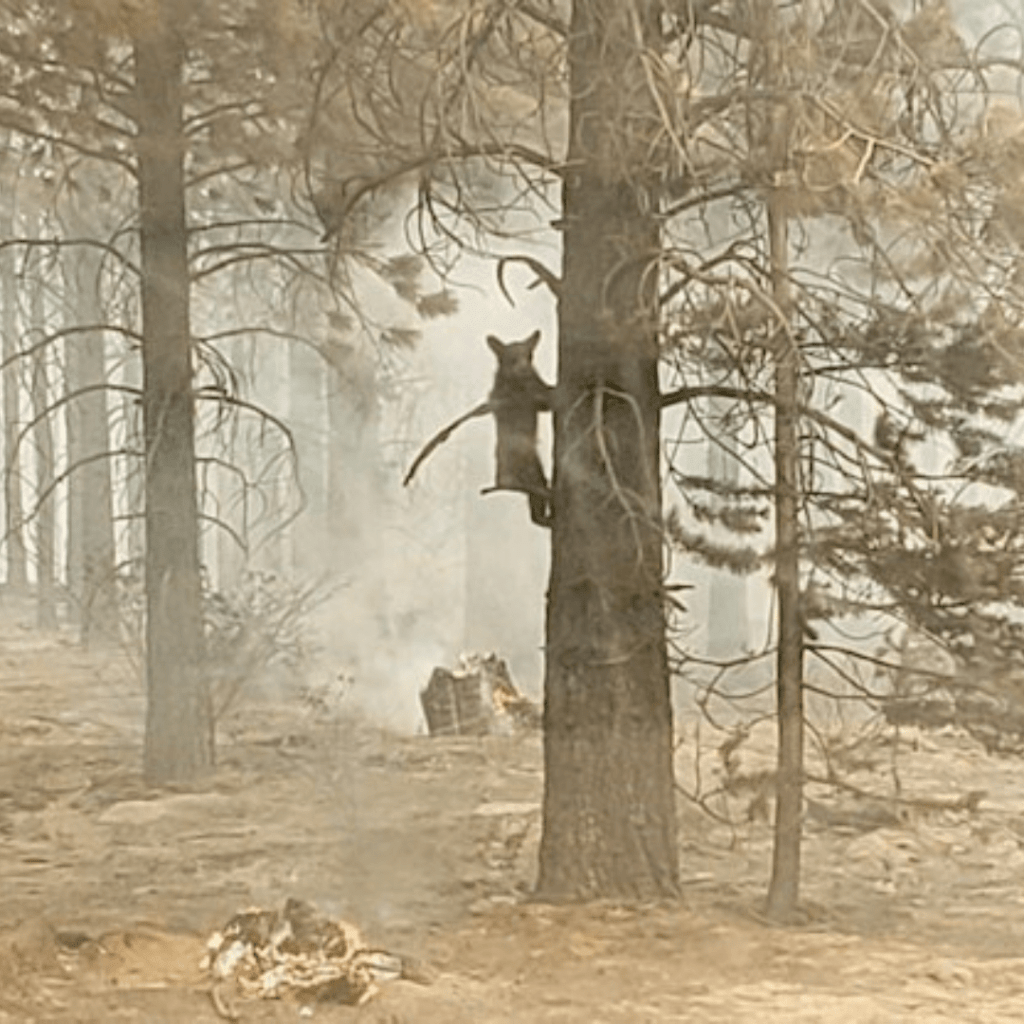Despite summer winding to an end, wildfire season is rearing its head again as many more wildfires have popped up throughout the state, causing evacuations, poor air quality, and concerns around life and property. At Think Wild, a wildlife hospital and conservation center in Bend, Oregon, nearby fires – including the Little Lava Fire near Mt. Bachelor, Firestone and Flat Top Fires – and associated poor air quality have renewed questions around how wildfires affect Oregon wildlife. And how can us humans help?
Fortunately, Oregon’s native species are adapted to forest fires, but that doesn’t mean that many won’t suffer or lose their lives. Wildfires cause immediate habitat loss and potential die-offs, and they change ecosystem structure for years to come. Some species that depend on mature forests – tree cavity-nesting owls, for example – may experience population reductions while those that thrive in young forests, like songbirds and burrowing mammals, may increase.
In the short term, with the severity and scale of the current wildfires, wildlife may be more likely to enter urban areas and exhibit unusual behavior while fleeing smoke and fire over the next few weeks. They will also be in search of food resources, which will be significantly depleted in the immediate aftermath of the fire.
“This late in the season, there are thankfully fewer nestlings and very young and vulnerable wildlife to get caught in a wildfire. By mid-September, most first-year wildlife have fledged or are mobile enough to escape and seek shelter,” said Sally Compton, Think Wild Executive Director. “That being said, the fires will diminish territories and available habitat, making resources more scarce and increasing competition. This can be especially challenging for young wildlife still learning to hunt or forage, as well as those needing to bulk up before the winter.”
Heat, wildfire, and poor air quality can also have similar effects on wildlife that we experience ourselves. “During times of extreme heat or poor air quality, we do have animals that come in exhibiting symptoms related to dehydration, heat exhaustion, general disorientation, and respiratory issues,” said Think Wild’s Director of Wildlife Rehabilitation, Pauline Hice. She advises people to “watch for wildlife traveling through your property fleeing fire, seeking shelter and looking for food and water. Do not panic or approach these animals but monitor at a safe distance. If you notice wildlife exhibiting odd behaviors or are concerned about an injury, please contact your local wildlife rehabilitation center.”
Though wildlife hospitals across Oregon are not yet being inundated with wildfire-specific calls, we expect cases to increase as ecosystem changes take effect and as people enter back into affected areas and are more likely to come across wildlife in need of help.
Here are some ways that you can help native wildlife and your local wildlife hospitals:
-
Do not leave food out or feed wildlife. If you have a bird feeder, clean it often. You can leave water out away from your house as long as you change it often.
-
Make sure water features on your property, such as irrigation ponds, provide an exit strategy for wildlife to climb out. Rocks, rope, and logs are helpful additions to prevent wildlife from drowning.
-
Keep dogs and cats indoors as much as possible during times of hazardous air quality. This will protect them and also prevent cat- and dog-related injuries to small animals and baby wildlife that may be moving about or seeking refuge.
-
Do not approach wildlife. Call your local wildlife hospital if you find injured or orphaned wildlife or if you see wildlife behaving strangely and are uncertain of how to proceed.
-
If you find an animal that has been burnt and are waiting to get in contact with a wildlife hospital or vet, do not feed them. Wrap the animal loosely in 100% cotton and place them in a well-ventilated box in a dark and quiet place.
-
Be conscious of your water usage. Try to minimize water use, especially during droughts, the hot, dry summer months and wildfire season.
-
Pay attention to burning restrictions, especially when traveling to another location. Stay educated on potential fire hazards – small, contained fires can become disastrous very quickly.
-
Your local wildlife hospital could always use more donations and supplies. Most wildlife hospitals (including Think Wild) receive little to no government funding and rely on individual in-kind and cash donations.
This list is non-exhaustive, but we hope that you find it helpful. If you ever have questions, Think Wild’s wildlife hotline, (541) 241-8680, is available seven days a week from 8 AM to 5 PM. Think Wild is a 501(c)(3) non-profit organization, and tax-deductible donations can be made at www.thinkwildco.org/donate or mailed to PO Box 5093 Bend, OR 97708.
###
About Think Wild
Think Wild is a 501(c)3 non-profit organization located in Bend, Oregon. Our mission is to inspire the High Desert community to care for and protect native wildlife through rescue and rehabilitation, outreach and education, and conservation. We provide veterinary treatment and care at the wildlife hospital, staffed by expert wildlife rehabilitation staff, animal husbandry volunteers, and our staff veterinarian. Wildlife conflicts or injuries can be reported to our Wildlife Hotline at (541) 241-8680, which is monitored seven days a week from 8 AM to 5 PM. Visit us online at thinkwildco.org, or on Instagram or Facebook @thinkwildco.

